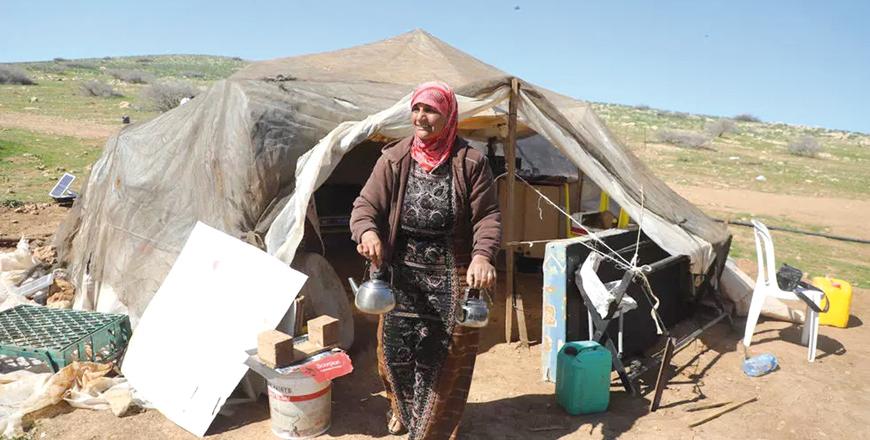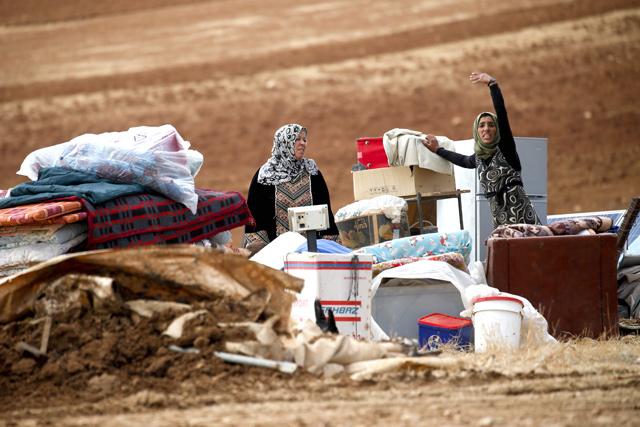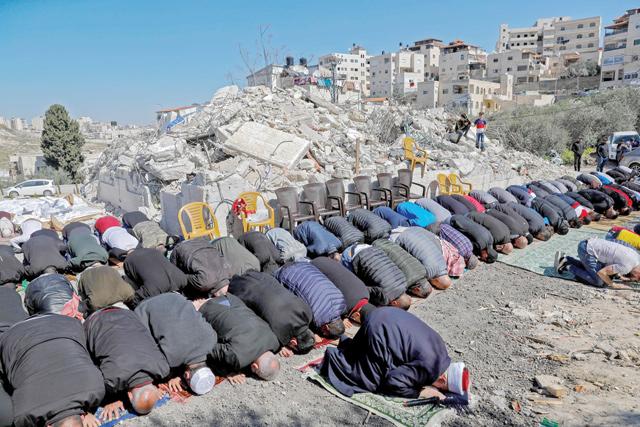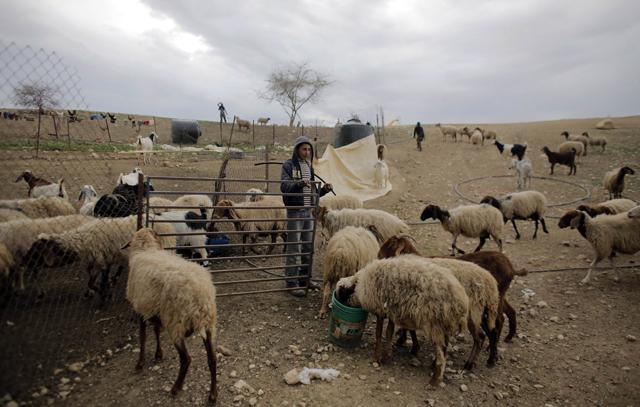You are here
Set up, demolish, repeat: Israel targets Bedouin tent community
By AFP - Feb 20,2021 - Last updated at Feb 20,2021

Fadwa Abdelghani walks outside her tent in the Bedouin village of Humsah Al Baqia, which has emerged as a flashpoint in the struggle over the Israeli-occupied West Bank (AFP photo)
KHIRBAT HUMSAH, Palestinian Territories — With a mosaic of shattered glass lying at her feet, remnants of a solar panel smashed by Israeli soldiers, Fadwa Abdelghani wearily recounted the military’s latest order to leave her home.
“The [Israeli] soldiers came here 30 minutes ago and told us we had to go,” the Palestinian Bedouin told AFP.
“We’re afraid they will come back and destroy everything,” she said, referring to her tent community in Humsah Al Baqia in the occupied West Bank.
Humsah Al Baqia sits in the Jordan Valley, a fertile and strategic patch of land that runs from Lake Tiberias to the Dead Sea, which has emerged as a flashpoint in the struggle over the West Bank.
It is in the West Bank’s so-called Area C, occupied Palestinian territory that remains under full Israeli military control.
Under Israeli military law, Palestinians cannot build structures in the area without permits, which are typically refused, and demolitions are common.
Israeli rights group B’Tselem has accused Israel of creating “a Kafkaesque reality that leaves Palestinians almost no way to build legally”.
In November, Israeli forces demolished the homes of nearly 80 Palestinian Bedouin in Humsah Al Baqia, in a rare operation targeting an entire village at once.
Since then the Bedouin have repeatedly gone back to Humsah Al Baqia and reerected their tents, only to see Israeli forces return to tear them down again.
According to the United Nations Office for the Coordination of Humanitarian Affairs (OCHA), the Israelis demolished 62 structures in Humsah Al Baqia through the first half of February, “leaving 60 people, including 35 children displaced”.
Closed military zone
Shortly after AFP arrived in Humsah Al Baqia to meet Abdelghani and her black-bearded husband Abu Awad, the Israeli army showed up again.
They insisted the area was a closed military zone, despite the absence of signs indicating such restrictions, while a soldier threated to confiscate AFP’s vehicles.
Palestinian and Israeli anti-occupation activists say the army has used the military zone classification as a tool to further restrict Palestinians from accessing land in Area C.
“It is not really a military zone. The soldiers train much further,” Abu Awad said, while eating a salad and sheep’s milk cheese.
He echoed the sentiments of others in the Palestinian Bedouin community who say they have lived in the Jordan Valley since well before the Israeli occupation began in 1967 and do not need a permit to set up tents.
“These lands are ours. The soldiers come here as invaders but we will not leave,” he said.
Our weapon is our presence
After the soldiers left, two Israelis arrived bringing toys and clothes for Bedouin children, playing on a nearby mound of earth.
One, named Burma, lost a son in Lebanon when Israel’s army occupied parts of its northern neighbour, while the other, Shoshi, had served in the air force.
“We also brought waterproof nylon tarps to protect their tents, but we left them elsewhere because the soldiers were here,” said Shoshi, smiling mischievously.
“The Bedouin will pick them up at night and bring them to their camp on donkeys,” she explained.
The game of cat-and-mouse in Humsah Al Baqia is part of the larger Palestinian effort to push back against Israel’s continued absorbtion of Area C, Palestinian experts said.
Parts of the Jordan Valley were earmarked for Israeli annexation under former US president Donald Trump’s now defunct Middle East peace plan, which was enthusiastically cheered by Israeli Prime Minister Benjamin Netanyahu.
While the Trump plan may be dead, Israel continues to approve the construction of Jewish settlements.
Settlements have boomed since Netanyahu returned to office in 2009, with some 475,000 Jews now living in West Bank communities widely regarded as illegal under international law, alongside some 2.8 million Palestinians.
Some see the Bedouin as a bulwark against settlement expansion.
“Israel wants Palestinians to leave these lands so it can bring in more settlers,” said Muataz Basharat, a senior Palestinian Authority official, while visiting Humsah Al Baqia.
“We are defending our land. Our weapon is their presence,” he added, gesturing to two Bedouin men.
Related Articles
TUBAS, Palestinian Territories — Israeli forces have demolished the homes of nearly 80 Palestinian bedouins in the occupied West Bank, offic
UNITED NATIONS, United States — The United Nations and European members of the Security Council on Friday called on Israel to stop demolitio
Palestinian shepherd Mahmoud Ka’abneh has squeezed his family of 12 into a neighbour’s hut on a hilly desert oasis since an Israeli bulldozer turned his own flimsy dwelling into a pile of stones and twisted metal.














